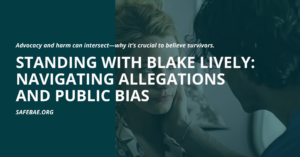Standing with Blake Lively: Navigating Allegations and Public Bias
Advocacy and harm can intersect—why it’s crucial to believe survivors.
The Spotlight and the Shadows: Navigating Public Perceptions in the Wake of Harassment Allegations
When It Ends With Us hit the spotlight earlier this year, it sparked waves of discussion—not just about the film itself, but about the dynamics between its two leading stars, Blake Lively and Justin Baldoni. Press tours were filled with conversations that painted Baldoni as a thoughtful advocate for women, while Lively faced criticism for her handling of certain interviews and the way she approached the film’s more sensitive themes. The public narrative seemed to draw a sharp contrast between the two co-stars, placing Baldoni on a pedestal while questioning Lively’s motives and sincerity.
Fast forward a few months, and the landscape has dramatically shifted. Lively has come forward with a lawsuit alleging sexual harassment, bringing a sobering depth to what was once a media frenzy. Her allegations shed light on the complexity of power, perception, and the challenges survivors face in being believed—especially in the glare of Hollywood’s spotlight.
This isn’t just a story about one case or one film; it’s a clear reminder of how two things can be true at once. Public perception and private realities don’t always align, and survivors’ stories often collide with preconceived notions about who they are—or who they’re up against. In this article, we’ll unpack the lawsuit, its implications, and the dangerous narratives that arise when society rushes to discredit survivors.
Allegations and Legal Action: A Closer Look
In December 2024, Blake Lively filed a formal complaint with the California Civil Rights Department against her It Ends With Us co-star and director, Justin Baldoni, alleging sexual harassment and retaliation through a coordinated smear campaign.
The allegations in Lively’s complaint are detailed and deeply troubling, including:
- Unwanted Physical Advances: Lively claims Baldoni improvised unsolicited kissing during filming, violating established boundaries.
- Inappropriate Conduct: Baldoni allegedly made sexual comments and discussed his personal sex life on set, contributing to a hostile work environment.
- Boundary Violations: The complaint outlines incidents where Baldoni and producer Jamey Heath entered Lively’s makeup trailer without permission while she was in a state of undress.
- Exposure to Explicit Material: Heath reportedly showed Lively a video of his wife giving birth, which Lively found distressing and inappropriate.
In response to these incidents, Lively and her husband, Ryan Reynolds, held a meeting with Wayfarer Studios, demanding safeguards such as the hiring of a full-time intimacy coordinator and the cessation of inappropriate behaviors.
Lively’s complaint goes on to allege that Baldoni and Heath hired crisis management experts to orchestrate a smear campaign against her, using social media manipulation and negative media placements to tarnish her professional reputation. Baldoni has publicly denied the allegations, dismissing them as false and an attempt to rehabilitate Lively’s reputation.
Adding weight to this story is the journalist behind the reporting: Megan Twohey of The New York Times. Renowned for her groundbreaking investigation into Harvey Weinstein that sparked the #MeToo movement, Twohey’s involvement highlights the gravity of these allegations and the credibility of the reporting.
In the wake of the lawsuit, Baldoni’s talent agency, WME, terminated their professional relationship with him. Meanwhile, Lively has received public support from her Sisterhood of the Traveling Pants co-stars—America Ferrera, Amber Tamblyn, and Alexis Bledel—who praised her courage in demanding a safe work environment and condemned the alleged efforts to undermine her.
This case, breaking under the trusted lens of Megan Twohey, continues to unfold, raising critical questions about accountability and workplace safety in Hollywood.
Two Truths Can Coexist: Examining Complexity in Public Perception
In situations like this, where public figures are embroiled in serious allegations, it’s tempting to reduce them to one-dimensional characters. However, reality is rarely that simple. Blake Lively’s press approach during It Ends With Us promotion drew significant criticism—many felt her tone was dismissive or lacking nuance in addressing domestic violence themes. But here’s the critical point: her handling of press tours and her experience of alleged sexual harassment are not mutually exclusive.
Similarly, Justin Baldoni has long been celebrated for his advocacy around domestic violence awareness and his calls for redefining masculinity. Yet, if the allegations in Lively’s lawsuit are true, it underscores a stark reality: people can present one way publicly while engaging in harmful behavior privately. His work in raising awareness doesn’t erase the possibility of causing harm—it highlights the complexities of human behavior and the importance of accountability, even for those we admire.
Blake’s critics often point to her press interviews as justification for dismissing her claims, but this reasoning is flawed and perpetuates harmful myths about survivors. Victims of harassment and abuse don’t always conform to preconceived notions of how they “should” act, and their past actions don’t invalidate their experiences.
The truth is, we live in a world where multiple realities coexist. Someone can raise awareness about domestic violence while perpetuating harm themselves. A survivor can make mistakes, have unflattering moments, and still deserve to be heard and believed. Acknowledging this duality is critical to fostering a culture of accountability and empathy, especially when confronting issues as complex as harassment and abuse.
This nuanced understanding challenges us to hold space for complexity, resist the urge to rush to judgment, and approach these conversations with care and thoughtfulness.
Closing the Conversation with Compassion
The allegations surrounding Blake Lively and Justin Baldoni remind us of the complexities of public narratives and the importance of approaching these issues with empathy and care. Survivors of harassment and abuse often face scrutiny that goes beyond their claims, with their behavior, choices, and even public personas unfairly held against them. This case is a reminder of the nuanced realities that survivors navigate—and the courage it takes to come forward.
At SafeBAE, we believe in creating a culture where survivors are supported, believed, and empowered to share their truths, no matter how complex the circumstances. Believing survivors is not only an act of compassion but also a critical step toward dismantling rape culture and creating environments where harm is addressed and justice is pursued.
This conversation is about dismantling harmful stereotypes, challenging our biases, and ensuring that every survivor feels safe enough to be heard.
If this story resonates with you, let it be a call to action. We all have a role to play in fostering safe, respectful environments, whether in our schools, workplaces, or broader communities. By educating ourselves, advocating for change, and supporting survivors, we can move closer to a world where accountability and compassion are the norm.
Let’s continue the work together. To bring SafeBAE’s transformative programs to your community or support our mission, visit safebae.org. Every step we take together is a step toward a safer future.


